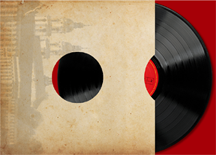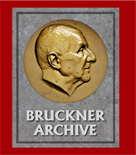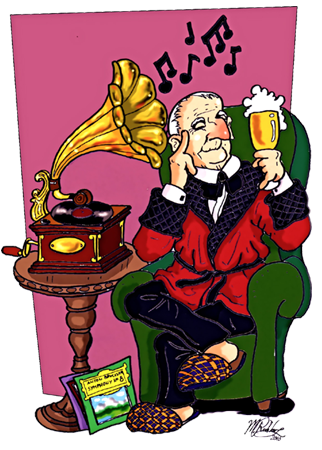An Evaluation by Sol Siegel
| I promised (threatened?) Bill before we set out for home that I would write up my own impressions of the music for the RCMR newsgroup. Well, here it is. My opinions are my own, and no offense is intended (as opposed to a famous riposte attributed to Brahms). Best again, Sol ------------------------------------------------------------------------------------ 11 Bruckner symphonies in 14.5 hours. Yeah, we can do that. Such was the reasoning of the First East Coast Brucknerathon in Simsbury, CT on Saturday last (Sept. 5). About 20 attendees, from the area from Boston, from Jersey, from Texas (flights to Hartford were from there were about a third the price of a flight from Philly) and even the UK sat and girded their metaphorical loins for the fray. John Berky (I assume) provided most of the music, while Ken and Ruth Jacobson graciously provided the listening room, equipment, chow, brew (well, we did have to pay for that) and hospitality. Ken Ward, editor of the Bruckner Journal (he was the UK participant) handed out Bruckner cloisonne pins. Perhaps 15 of us were actually there in time for the 8 AM start. Here's my assessment of the music. Most of these recordings will be difficult, if not impossible, for the average RCMRer to get their hands on, but I simply couldn't resist. I never can, can I? Symphony in F minor, a.k.a. "Study-Symphony" (1863): Dong-Ho Lee / Jeju Philharmonic (Korea) (2008 - part of a largely self-recorded complete cycle). A rough-and-ready live rendition of a rough-and-ready symphony. Lee wisely looked backward, at Schubert, Beethoven, Mendelssohn and Schumann, rather than forward at the mature Bruckner. It was fun, only made more so by an ensemble that seemed to be chugging, "I think I can, I think I can" as it went along. No. 1 in C minor (1866 Linz / Ed. Carragan): Georg Tintner / Scottish National Orchestra (Naxos). When the program was announced, I wished they would start with this one - it would have been out of order, but I own it, and I could have slept another hour. But that would have been distinctly impolite to William Carragan, who was there to help explicate differences between his and later editions of the early symphonies, and even supplied printed comparisons. (By the end of the weekend he was allowing me to call him Bill; I wonder if that will survive this posting.) There's nothing wrong with the recording, of course. Tintner managed to give the work a little extra gravity without losing its youthful (at 42?) drive, and it's nice to hear the little cuts opened up. Symphony in D minor, a.k.a. "Die Nullte" or "No. 0" (1869): Gennadi Rozhdestvensky / USSR Ministry of Culture Orchestra (BMG CD) (1983). A hell-for-leather performance by not only the first conductor to record all 11, but who taped nearly all the then-available versions. One listener joked, "Too bad they couldn't play it any faster." My joke was that the engineer betrayed the great tradition of Soviet tape editing: I couldn't detect a single moment in which it sounded like they switched halls in mid-phrase. Symphony No. 2 in C minor (1872 Edition / Ed. Carragan): Herbert Blomstedt / Montreal Symphony Orchestra (2007). I really, really wish there was some way you could purchase this one, a concert that wouldn't even have been recorded if Carragan, who was there, hadn't insisted on it. The early Bruckners, and especially this one, are at least as much about the struggles behind their own creation as about Bruckner's struggles with God, the universe and anything else, and this first version of the 2nd Symphony - before the cuts, and the rewriting to make it more in the style of his later works, or the return of the scherzo to the third-movement position - exposes this more than anything. Then there's the performance, which is edge-of-the-seat thrilling and darned near crazy. (One would scarcely believe it the work of an 80-year-old conductor!) This was the biggest revelation of the day for me. Symphony No. 3 in D minor (1874 version / Ed. Carragan): Akira Naito / Tokyo New City Orchestra (2009). The year after Bruckner dedicated this symphony to Wagner, condemning him to intemperate critical attack by the Brahmsians for the rest of his life, he polished the score, making a few small cuts but leaving in the Wagner quotes. He supposedly said he was happy with this version, but it's never been heard until now. But there's a big problem with this one-off live recording - the brass flat-out missed their last entrance in the first movement, and the rehearsal recording failed. So this recording, which was supposed to appear in Naito's series of rare Bruckner editions for the Japanese Delta label will remain on the shelf for the time being at least. The rest of the performance? Not bad, but not so great that I won't hope for someone else to quickly pick up the ball that Naito's brass section dropped. Symphony No. 4 in E-flat (1878/80 Nowak Ed.): Giuseppe Sinopoli / Philharmonia Orchestra (1988 NHK DVD). Due to a family emergency, Benjamin Korstvedt had to cancel his appearance to talk about his edition of the 1888 score, so it was decided at the last minute to substitute this Japanese video of the standard Nowak with the visiting Philharmonia. Beautifully played and all that, but after the craziness of the previous few hours it seemed pretty tame. There were titles, mostly in Japanese but sometimes in Chinese or Korean, that sometimes appeared during the music, proclaiming the names of orchestra and conductor; I could not resist making my own interpretations, such as "Take courage, the movement will soon be over" or "This is really Michael Keaton wearing a false beard, wig and spectacles." Symphony No. 5 in B-flat (1878 Nowak Ed.): Heinz Roegner / Berlin Symphony Orchestra (1984) (Berlin Classics CD). At dinner the evening before a vote was taken between this and Van Beinum; this won because it's faster. In fact, at 68:26 it's the fastest 1878 Bruckner 5th on disc, even faster than the wartime Furtwangler. It's more evenly paced than that loony performance, but the finale is as wild a ride as you could imagine. Perhaps wilder than you would believe he could get away with, really. Symphony No. 6 in A (Hynais Edition): Ira Levin / Norrlands Opera Orchestra (2008) (Lindoro CD). This derives from the 1899 Doblinger edition, the work's first publication, and it's the first recording thereof since that of that recording pioneer F. Charles Adler. It was included in this survey because of recent research suggesting that Bruckner had more input into this edition than previously thought. The changes consist of a few odd (sometimes very odd) crescendos, diminuendos, accelerandos and ritardandos. Carragan wasn't convinced by any of the dynamic changes. For my part there was one crescendo just as the big theme was entering in the finale that ruins the effect. Too bad. On the whole, Levin knows his way around the score, the orchestra plays well, and the recorded sound was about the best I heard all day, with excellent balances and instrumental placement. Symphony No. 7 in E (Gutmann Ed., w. percussion in Adagio): Eugen Jochum / Concertgebouw Orchestra (1986 - Tokyo) (Altus DVD). Live from the Gunze Music Festival, a score that Jochum and the orchestra could do in their sleep, separately or together - but they didn't. (In Jochum's case, there would be time enough for sleep, and soon.) Yes, the first movement and scherzo are a little slow. And the Adagio is *way* too slow. But watching the sepulchral (and seated) Jochum as he coaxes every detail from an orchestral he's been conducting for half a century is an indelible sight. The finale? Spot-on, the little stops and restarts perfectly judged. And then the capper: after the last downbeat, as the audience is starting to go wild, Jochum playfully sticks his tongue out at the orchestra! Wonderful. Symphony No. 8 in C minor (Haas Ed., 1890): Takashi Asahina / Osaka Philharmonic (2001) (Exton DVD). After a desperately needed dinner break (Italian buffet), we regrouped for a completely new experience: a hard-to-find-in-the-US DVD of a concert performance of a late Bruckner symphony by a white-haired conductor in the final year of his life. Facetiousness aside, this did make for an interesting contrast to Jochum. The main difference is that Asahina, in what little I've experienced of his work, did as good a job of keeping his ego hidden as any conductor I know of. (This makes the video production, which sometimes makes him look like a god towering over the orchestra through clever superimpositions, seem rather disingenuous.) The orchestra isn't the Concertgebouw, especially in the strings, but plays well enough in a straightforward 8th that somehow manages to be rather more. Symphony No. 9 in D minor (Nowak Ed.): Fabio Luisi / Dresden Staatskapelle (2007) (Sony CD) - followed by Mvt. 4 (2006 Carragan Completion): Akira Naito / Tokyo New City Orchestra (Delta CD). The Luisi, lauded in Europe but unavailable in the US, clocks in at nearly 64 minutes, which surprised me because it seems faster. It's almost frighteningly confrontational, and except for a handful of inexplicable slowdowns, including one right near the end of the first movement, avoids the tendency to overinterpret that's been running rampant in classical performance for the past several decades. The orchestra plays like the heroes of Valhalla, and the SACD sound is pretty effective. We finished off our total Bruckner experience by adding Carragan's third (he's revised it again since, and it's being played in Arizona this fall) completion of the finale. After hearing recordings of earlier Carragan and SPCM attempts, I've been convinced that the greatest value of Bruckner 9 completions is to try to get musicians and perhaps conductors as well, to rethink their approaches to the three completed movements. (Whatever you think of the material Bruckner left behind - that which wasn't stolen by autograph seekers that is - it requires different tempo decisions to make it "match up", just for starters.) This new recording doesn't exactly change my mind, but Bill's coda is so ecstatic that I wouldn't want to do without it. So we went "Bravo Bill!" before saying our goodnights and thank-yous and trying to find our homes and hotels on strange roads near midnight. |





